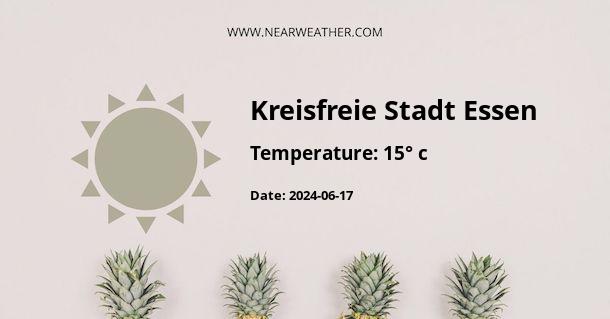Climate and Weather in Essen, Germany: An In-Depth Overview
Located in the heart of the Ruhr metropolitan region, Kreisfreie Stadt Essen is an intriguing city in the western part of Germany. Its climate and weather patterns reflect the characteristics of a temperate oceanic climate zone, with nuances shaped by its urban setting and geographic features. In this article, we will delve deep into Essen's climatic conditions, providing insights gleaned from meteorological data and expert analyses to help understand what weather one can expect year-round in this vibrant city.
General Climate Characteristics
In line with Köppen climate classification, Essen experiences a Cfb climate—temperate oceanic, typified by mild to warm summers and cool winters. Precipitation is fairly distributed throughout the year, although the late summer months may see slightly more due to convective rain patterns. As an urban area, Essen’s weather can also be subject to the urban heat island effect, which can lead to marginally higher temperatures compared to the rural surroundings.
Seasonal Weather Overview
- Spring: From March to May, temperatures in Essen transition from a cooler climate to the mild warmth of late spring. Average temperatures range from 5°C to 15°C (41°F to 59°F). Precipitation is steady, and the onset of the growing season introduces a lushness to the city's many parks.
- Summer: June through August marks the summer season, characterized by warmer temperatures that average from 14°C to 23°C (57°F to 73°F). However, scorching heat waves can occasionally strike, pushing temperatures above 30°C (86°F).
- Fall: As fall approaches from September to November, the temperatures drop steadily from mild to brisk, with averages ranging from 10°C to 16°C (50°F to 61°F). The city begins to experience shorter daylight hours and the foliage adorns itself in vibrant hues.
- Winter: December through February marks the winter period in Essen. Temperatures hover around 0°C to 6°C (32°F to 43°F), with occasional dips below freezing. Snowfall is possible, though not exceedingly common, with rain being more prevalent.
Average Temperatures and Precipitation
| Month | Average High (°C) | Average Low (°C) | Precipitation (mm) |
|---|---|---|---|
| January | 4 | 0 | 70 |
| February | 5 | 0 | 50 |
| March | 9 | 2 | 68 |
| April | 14 | 4 | 54 |
| May | 19 | 8 | 72 |
| June | 22 | 11 | 92 |
| July | 24 | 13 | 86 |
| August | 24 | 13 | 78 |
| September | 20 | 10 | 73 |
| October | 14 | 7 | 62 |
| November | 9 | 3 | 71 |
| December | 5 | 1 | 78 |
Note that these statistics are based on historical averages and are typical of what Essen experiences, but individual years can see significant deviations from these norms.
Extreme Weather Events and Variability
"Essen, like many cities in Germany, is not immune to the influence of a changing climate. We are seeing a trend towards more extreme weather events, such as heatwaves and heavy precipitation, which can disrupt the daily life in our urban centers," explains Dr. Selena Berger, a climate researcher at the University of Duisburg-Essen.
In recent years, Essen has confronted episodes of extreme weather, ranging from intense summer heat waves to winter storm systems that have swept across Europe. The risk of flooding from the Ruhr river during periods of heavy rain is a reality for the city's infrastructure, which is designed to cope with these periodic challenges.
Wind Patterns and Sunshine Hours
Wind patterns in Essen typically originate from the west, bringing moist Atlantic air into the region. Average wind speeds are relatively moderate but can be stronger during the fall and winter months. As for sunshine, Essen receives a moderate amount of sunny days, with an annual average of around 1,600 sunshine hours. The months of May to August offer the most sunshine, contributing to the overall enjoyment of outdoor activities during the summer.
Climate Adaptation Measures
The city officials and environmental planners of Essen are proactive in developing and implementing climate adaptation and sustainability measures. Essen was even named the European Green Capital in 2017, in recognition of its efforts to improve the urban environment and sustainability practices.
- Green infrastructure: Increasing green spaces to combat the urban heat island effect and enhance rainwater absorption.
- Public transportation: Investing in cleaner, more efficient public transit systems to reduce carbon emissions.
- Energy efficiency: Retrofitting buildings with energy-saving technologies.
- Educational programs: Raising public awareness about the importance of sustainable practices and personal contributions to climate resilience.
Summary and Seasonal Recommendations
Understanding Essen's climate is essential for residents and visitors alike. The temperate conditions offer a relatively comfortable environment year-round, although everyone should prepare for rain at any time. Tourists planning to visit Essen can enjoy the outdoor cafes in the summer, the beautiful parks in spring and fall, and the traditional Christmas markets in winter. Dress accordingly for the season, and keep an eye on the weather forecast, especially if an extreme weather event is projected.
With this comprehensive overview of Essen's climate and weather patterns, including detailed statistics, seasonal characteristics, and climate adaptation measures, those interested should now have a thorough understanding of what to expect from Essen's weather year-round.
A - Kreisfreie Stadt Essen's Latitude is 51.458290 & Longitude is 7.015970.
A - Weather in Kreisfreie Stadt Essen is 12° today.
A - Climate Conditions in Kreisfreie Stadt Essen shows scattered clouds today.
A - Humidity in Kreisfreie Stadt Essen is 43% today.
A - Wind speed in Kreisfreie Stadt Essen is 1.62 km/h, flowing at 67° wind direction. today.
